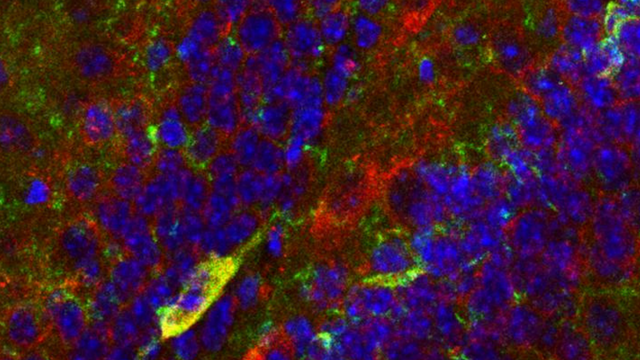 In the mouse dentate gyrus, cholecystokinin neurons (red) and a protein they produce (p11; green) that's critical for initiating a response to selective serotonin reuptake inhibitors LABORATORY OF MOLECULAR AND CELLULAR NEUROSCIENCE AT THE ROCKEFELLER UNIVERSITY/NEURON Selective serotonin reuptake inhibitors (SSRIs) are drugs used to manage depressive disorders, but their precise mode of action is elusive. Researchers recently demonstrated that SSRIs target certain receptors on cholecystokinin neurons in the mouse hippocampus and prevent them from releasing inhibitory neurotransmitters, the first steps in a longer cascade.
In the mouse dentate gyrus, cholecystokinin neurons (red) and a protein they produce (p11; green) that's critical for initiating a response to selective serotonin reuptake inhibitors LABORATORY OF MOLECULAR AND CELLULAR NEUROSCIENCE AT THE ROCKEFELLER UNIVERSITY/NEURON Selective serotonin reuptake inhibitors (SSRIs) are drugs used to manage depressive disorders, but their precise mode of action is elusive. Researchers recently demonstrated that SSRIs target certain receptors on cholecystokinin neurons in the mouse hippocampus and prevent them from releasing inhibitory neurotransmitters, the first steps in a longer cascade.
See L. Medrihan et al., “Initiation of Behavioral Response to Antidepressants by Cholecystokinin Neurons of the Dentate Gyrus,” Neuron, 95:1-13, 2017.













